‘Catholic News’ is a podcast carrying interviews with a diverse range of people – lay people, religious and clergy – involved on the front line of the Catholic Church’s work in England and Wales.
9th August 2022
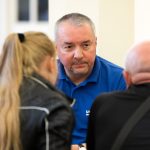
The director of a new Ukrainian Welcome Centre in central London has urged Britons to keep their hearts and doors open to Ukrainians who are arriving in the UK fleeing the war in their homeland.
Andriy Marchenko talks to us about the Centre, based at the cathedral of the Ukrainian Catholic Eparchy of the Holy Family near Bond Street in central London
It provides a single point of contact for essential information for arrival, settling and long-term living in the UK and is a partnership between the Ukrainian Catholic Eparchy of the Holy Family of London and the Association of Ukrainians in Great Britain.
“Many of these people have come through a lot of hardship before ending up in the United Kingdom. Many have been through a lot and they tend to be stressed out, they tend to be disoriented sometimes and we aim to help them, to signpost them to the right services in the UK, to give them correct advice so that they know exactly what to do – what their next move should be in order to succeed and, eventually, to thrive in the United Kingdom.”
My name is Andriy Marchenko. I’m the director of the Ukrainian Welcome Centre. The Ukrainian Welcome Centre has been set up in London as a joint initiative of the Ukrainian Catholic Eparchy of the Holy Family of London and the Association of Ukrainians in Great Britain. This is, of course, a direct response to the escalation of Russia’s war against Ukraine. It is common knowledge that there are many Ukrainians who are coming to the United Kingdom as they are seeking refuge here from Russian attacks.
Our centre aims to support these people as they arrive in the United Kingdom. They need to settle, they need to get all their documentation ready, they have to send their children to schools – the majority of those who are coming are mothers with children. They need to find the proper accommodation, they need social support, they need to find jobs, they need practically to start life anew – even if it is for a little while.
Many of these people have come through a lot of hardship before ending up in the United Kingdom. Many have been through a lot and they tend to be stressed out, they tend to be disoriented sometimes and we aim to help them, to signpost them to the right services in the UK, to give them correct advice so that they know exactly what to do – what their next move should be in order to succeed and, eventually, to thrive in the United Kingdom.
We normally organise open days here at the centre where Ukrainians can come and ask the questions that are troubling them. We also get quite an extensive support from the UK government. So, for instance, the Home Office Department for Levelling Up and the Department for Work and Pensions send their representatives to our centre for drop-in sessions with the Ukrainians where they can actually directly point those questions to the government.
We also provide additional services such as psychological support, GP access, immigration lawyers and so forth. We have set up quite an operation, mostly volunteer-based, but of course we have a lot of support on the part of the Eparchy and also on the part of the Association of Ukrainians in Great Britain who have supplied a lot of knowledgeable people with a lot of experience in dealing with such matters, who are instrumental to running this centre. I feel blessed that I am surrounded by so many people.
We have lots of plans for the future. Right now we have been more or less setting up [our operations] and the past few months have been what we would call the initial few months for our centre.
It is not a very easy process because there is quite a bit of bureaucracy involved. First of all, people have to apply from outside the United Kingdom to come here. So before coming here they need to be granted a visa. In order to get their visas, they need to travel outside Ukraine because there is no British visa centre in Ukraine. So first of all they have to travel to places like Poland, France or Germany and apply for UK visas there. They give their biometric data and then just wait for their visas to be processed. That can take quite a long time. For some lucky ones it is not very long, for some it takes a long time. I have heard of several people who have actually given up hope of getting a UK visa and travel to some other country or indeed back to Ukraine.
Once they’re here, the process can be quite difficult for those newcomers. So this is part of our mission – to try and help them. We give them a one-stop, single point of contact where they can get all the necessary basic information – where to go, which services to apply for, and where to apply for those services.
I think the most important thing is for these Ukrainians to remain connected to their homeland because they can end up in very different conditions and situations. Sometimes we have seen these people come in [to the centre] just to speak Ukrainian instead of getting their questions answered. So I think the essential part of it is to keep them together as a community so that when it’s time to go home they will remain integrated to Ukraine rather than detached from it.
The main challenge is, perhaps, that these people are really very stressed and they have been through a lot and sometimes when we hear these stories it can be quite shocking.
Please keep your hearts and doors open to Ukrainians because this is the decisive ground where history is actually being made. Ukrainian people are not coming here on a whim. They have to come here to find refuge from what’s happening in Ukraine. Russian forces, the Russian government, have been deliberately targeting civilian infrastructure in Ukraine and that includes residential quarters.
These people are actually on the run from something that’s unavoidable. They had to leave in order to survive, and by helping these people, the British nation is helping the Ukrainian nation survive – a fellow European nation. There is a lot of hardship but I would say that Russia is fighting a war against the whole of the civilised world and not just against Ukraine. It is very important to support Ukraine by supporting Ukrainian people.
The United Kingdom is at the forefront of supporting Ukraine and we would be absolutely grateful if British people continued this support to Ukrainian families at this grassroots level.
Practically all of them are asking, “Okay, you’re working at the centre, you probably know the situation better than us… When will it be safe to go back home?” We should remember that most of these women have left their men fighting in Ukraine. So, of course, they want to go back home, and they want their families reunited. Most of all, they want their old life back – their normal, peaceful life.
9th August 2022
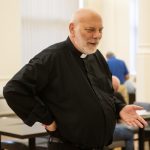
The Ukrainian Catholic Eparchy of the Holy Family has opened a Welcome Centre in London in partnership with the Association of Ukrainians in Great Britain.
Based at the Eparchy’s cathedral near Bond Street in central London, the Centre provides a single point of contact for essential information for arrival, settling and long-term living in the UK.
Bishop Kenneth Novakowski, the Ukrainian Catholic Bishop for the Holy Family of London, talks to us about the new welcome centre and how the Ukrainian community in the UK is working with the government, NGOs and other charities and organisations to help Ukrainians fleeing war in their homeland.
I’m Bishop Kenneth Novakowski, the Ukrainian Catholic Bishop for the Holy Family of London. The shock of the invasion of Ukraine in many ways seemed to almost paralyse people of conscience and goodwill throughout the world in those first few days. Eventually the Ukrainian people started to realise that they had to flee from their homes – to flee from harm’s way – because of the consistent bombings and invasion of their country.
And so in the first several weeks of the invasion we saw a huge migration of people departing their homes and their cities to western Ukraine. More than 7 million, in a very short time, left the country and made their way into the border countries with Ukraine – especially into Poland.
The government of the United Kingdom developed two schemes to receive displaced persons fleeing harm’s way. One was ‘Homes for Ukraine’ and the second was concerned with family reunification.
According to government statistics here in the United Kingdom, 100,000 displaced people from Ukraine have been welcomed into the UK. Very quickly our cathedral of the Holy Family in Exile in central London became the focal point for people wanting to help and for those needing help.
So along with the Association of Ukrainians in Great Britain, the Ukrainian Catholic Eparchy of the Holy Family decided to provide a safe place – a place of welcome – for those fleeing and also for those who are sponsoring people who have opened up their homes and their hearts. A place of welcome where we would work closely together with other non-government agencies and governmental agencies to provide information, counselling and even community for those who are fleeing.
We were able to provide fairly large premises in our cathedral dedicated to that goal of providing a place of welcome to our newly-arrived brothers and sisters. This joint venture is true community outreach, and I can’t emphasise enough the co-operation we have had from so many other non-governmental organisations, other religious communities and the government.
In the area of pastoral care and concern for not only those who are arriving but for those who feel they want to have a place to pray during the daytime, we have kept our cathedral doors open between 10am and 8pm. This allows people to come in, have a time of prayer and silence – a place where they can come and think about the benefits that we have here in the United Kingdom. They can say a prayer and light a candle – for those who have died in defending Ukraine, for those who are fleeing and for those who are helping those that have arrived here. As this war continues we can become desensitised to the horror that the war is bringing to Ukrainian people but the reality is that the war is still going on. People are still losing their lives, their homes, their businesses.
Here in the UK, through the work of so many people, we are providing a place that is safe allowing people to keep their dignity. It’s a place of welcome from which I continue to ask for people to pray for peace in Ukraine or those who are helping in the various charity organisations working in Poland, Ukraine, and all the other border countries – especially organisations like CAFOD, Caritas Ukraine, Caritas Internationalis and for all of those volunteers who every day are providing care and kindness to those fleeing harm’s way.
18th July 2022

The Lead Bishop for Marriage and Family Life, Bishop David Oakley, has spoken to us about a new resource that offers reflections on the main themes of Amoris Laetitia – the 2016 Post Synodal Apostolic Exhortation.
‘The Joy of Love’ looks at the themes of Joy, Love, Mercy, Realities and Discernment, and Mission encouraging prayer and reflection for individuals, couples and families.
The Joy of Love can also be found in our ‘Documents and Publications‘ area.
15th June 2022

In December 1916, deep in the Sahara, an unknown French hermit was shot through the head and dumped in a ditch. He was 58.
An accomplished geographer, linguist and explorer, in youth he had been a disillusioned soldier and aristocratic playboy.
Why at 30 did he abandon family, career, everything, to search for ‘the last place’, close to the poor and suffering?
This audiobook describes his epic pilgrimage from misery to love and of silent witness to Christ among the Tuareg of the Sahara, including his writings and prayers, and the work being done today by Little Brothers and Sisters of Jesus.
+++
This now out-of-print title offered by the Catholic Truth Society (CTS) was written by the late J. Fawley in 1999 and published a year later. But, fear not, this excellent book has not been lost. You can listen to this audiobook version for free. Read by Monica Nash.
Duration: 1 hour 21 minutes
13th May 2022
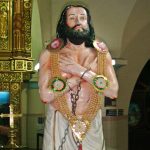
Bishop Thomas Neylon, Lead Bishop for Asia for the Bishops’ Conference, has recorded a short reflection on Blessed Lazarus, also called Devasahayam, an 18th-century Indian martyr. He was a married Hindu man who converted to Catholicism and suffered much persecution for his faith.
A Catholic for only seven years, he was shot dead in the Aralvaimozhy forest on January 14, 1752.
Statue of Devasahayam Pillai, St. Francis Xavier Cathedral, Kottar, Nagercoil
Kumbalam on Wikimedia Commons
CC BY-SA 3.0
12th May 2022

As an important part of our resources for the Day of Prayer for the Survivors of Abuse, we have produced an audio reflection on Psalm 121. We listen to an introduction before hearing a reading of the Psalm. Then a survivor offers her personal reflection on the psalm before we offer prayers for survivors of abuse, their families, friends and communities.
Psalm 121, I lift up my eyes to the mountains, is given the title of ‘A song of Ascent to Jerusalem’. The psalmist looks at the journey ahead of him, through mountains and hills, and seeks God to help him.
Survivors of Abuse are, unwillingly, thrust into to this journey, that for every moment of life after abuse, will always be mountainous at times, sometimes steady and more settled and also near on impossible at others.
The survivor journey can often feel lonely and isolated, and whilst always trying to move forwards, that sense of loneliness, of feeling fragmented, facing that steeply impossible mountain is often accompanied by a silent cry of ‘Who will help me?’
This question is often left unanswered, as the very nature of abuse can make it impossible to trust anyone to have your best interests at heart, to want to help you with your heavy load. Life lived in a paradox of needing help, but not being able to trust enough to accept it. This paradox means that the psychological impact continues to be perpetuated long after abuse ends.
12th May 2022
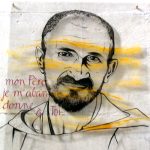
Bishop Paul Swarbrick, Bishop of Lancaster, introduces us to Charles de Foucauld, a former soldier and Trappist who will be canonised by Pope Francis on Sunday 15 May 2022.
Photo © Jean-Louis Zimmermann (CC BY 2.0)
11th May 2022

Titus Brandsma was a Carmelite friar who was killed in the Dachau concentration camp on 26 July 1942.
The Nazi invasion of Holland took place on 10 May 1940. Their persecution of the Jews is well known. Titus defended the Jewish people – especially Jewish children who attended Catholic schools. He said: “the Church in carrying out her mission makes no distinction between sex, race or people.”
In late 1941, Dutch Catholic media outlets were ordered to carry Nazi Party advertisements. The Catholic hierarchy asked Titus to intervene, which he did with great courage, writing to all editors of Catholic publications and pleading with them to defy the order. He was betrayed to the Nazi authorities.
He was arrested on 19 January 1942 and spent seven weeks at the prison in Scheveningen, before being transferred with a hundred other prisoners to Amersfoot concentration camp.
He spent nearly two months there, before being sent back to Scheveningen for further questioning. The head of the secret police called Titus “that dangerous little friar”. When it became clear that Titus would not go against his conscience and give in to the demands of the Nazi party, he was sent to Dachau.
He was taken to the camp ‘hospital’, in reality an experimental laboratory, where he suffered more degrading treatment. Finally, on 26 July 1942, an SS nurse administered the injection that would kill him.
Titus Brandsma was beatified by Pope Saint John Paul II on 3 November 1985 and was canonised by Pope Francis on Sunday 15 May 2022.
+++
This audiobook, produced in collaboration with the Catholic Truth Society (CTS), was written by Hugh Clarke and is read by Pierpaolo Finaldi.
It is taken from a collection of texts, published by CTS in ebook form, titled: Edith Stein, Marcel Callo, Titus Brandsma: Victims of the Nazis.
10th May 2022
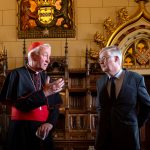
Cardinal Vincent Nichols spoke to journalists, remotely, about the Bishops’ first plenary meeting in Wales for 18 years.
The Cardinal, President of the Bishops’ Conference, looked back on the five-day meeting and talked about their discussions.
The meeting took place in Cardiff from 2 – 6 May 2022. Cardinal Nichols gave a briefing on the deliberations of the bishops, including Ukraine and refugees, the synodal process and challenges following the pandemic.
27th February 2022
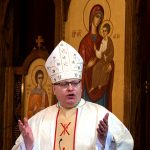
The Most Reverend John Wilson spoke passionately to the Ukrainian Greek Catholic community in the UK about the disastrous consequences that war has brought to Ukraine.
The Archbishop of Southwark was invited to preach at the Divine Liturgy at the Ukrainian Greek Catholic Cathedral of the Holy Family in central London on Sunday 27 February.
He spoke to us afterwards:
“The gospel today in the Ukrainian liturgy is the gospel of the Last Judgment. Whatever you do to the least of my brothers and sisters, you do it to me, said the Lord Jesus. We must hear these words. They must cut into our hearts.
“They’re not just words for Christians, they’re words for any decent person, that what we’re doing to others, we’re doing to Christ. We are misusing the gifts that we have to build up for peace by destroying through war. And so this must cease.
“This is the message of Christ, this is the message of every right thinking person – every right thinking nation. We must say no to war, we must say yes to peace and we must pray. We can feel powerless when we look on. We can give material support. We need to do that individually and as nations and governments, but as believers, as disciples of Christ. We must pray.”
25th February 2022
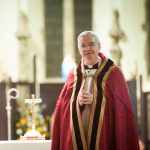
In a pastoral letter to the Catholic faithful of his diocese, Plymouth, Bishop Mark O’Toole has urged the community to pick up the spiritual weapons of prayer, fasting and almsgiving this Lent for the people of Ukraine.
This follows Pope Francis’ call to observe Ash Wednesday, 2 March, as a Day of Prayer and Fasting for Peace.
“We all feel somewhat impotent,” said the Chair of the Department of Evangelisation and Discipleship at the Catholic Bishops’ Conference of England and Wales in a Pastoral Message being sent to parishes in the Diocese of Plymouth today. The disciplines of Prayer, Fasting and Almsgiving “have a particular focus for us,” he said, “as we link these spiritual weapons to the reality of what we are living through in Europe at this time.“
7th February 2022
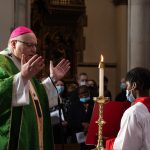
Speaking at a Mass in Brixton, South London, a week before Racial Justice Sunday, Archbishop John Wilson has talked about how important it is we use the occasion to affirm the dignity and place of every person in the life of the Church.
Stating explicitly that there is no place in the Church for racism and racial injustice, the Archbishop of Southwark said:
“One of the challenges for us is to think not just about the ‘heart’ in this question of appreciating people of different cultures and nationalities, but also to think about the ‘mind’. In a sense, we could say, ‘yeah, we’ve got to love everyone.’ I mean, that’s true. It comes from the Gospel. It’s the commandment of the Lord Jesus. But we also need not just to broaden our hearts, to love, but we need to broaden our minds to understand and to recognise that in the cultures of others, in the languages and traditions of others, there is something enormously enriching for the whole of the world.
“What none of us should do, I think, is live with a very narrow focus, that the world is about ‘me’ and where I live, my town, my country – it’s not – the world is about all of us. We should actually broaden our minds through education, to learn about different traditions.”
Racial Justice Sunday is celebrated in parishes throughout England and Wales on Sunday 13 February 2022.